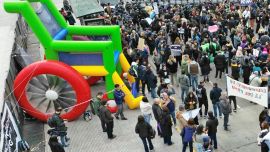In the same manner as a college student pulling an all-nighter ahead of finals, in order to catch up on all the studying that wasn’t done during the semester, Unión por la Patria has anointed Economy Minister Sergio Massa as the (quasi) unity candidate representing the ruling coalition ahead of the PASO primaries. The cards finally dealt, Argentina’s political ecosystem will now do the rounds in a high-stakes three-round game of poker, the outcome of which will determine the future of the nation. Across the aisle, Juntos por el Cambio has seen the intensification of the primary battle between Buenos Aires City Mayor Horacio Rodríguez Larreta and former security minister and PRO party (on-leave) leader Patricia Bullrich, demonstrating a certain Argentine incapacity for sportsmanship that isn’t too far from what candidates in the United States have us accustomed to, but that in a fragmented field could cost them dearly. Completing the main table and already having gone all-in is ultra-libertarian economist Javier Milei, the only candidate managing to connect empathically with a portion of the electorate and whose political novelty makes him completely unpredictable. With the first curtain of uncertainty lifted, it is go-time for the campaign.
A word must be said about the unruly negotiations that led to Massa’s candidacy, one that he’s been planning (not so) privately and denying publicly all along. Perfil’s Ariel Maciel has reported consistently on internal movements within the Economy Ministry in which Massa would resign leaving a placeholder minister in order to focus on the campaign. The fragility of the situation – with runaway inflation and the fate of the nation in the hands of Krystalina Georgieva and the International Monetary Fund – probably twisted his arm. As did the political developments that led to the formal and quickly withdrawn announcement of Eduardo ‘Wado’ de Pedro and Juan Manzúr as Unión por la Patria’s headline ticket. In the tripartite battle that has been this administration, President Alberto Fernández has insisted that holding primaries would strengthen the coalition, in great part as an argument to mask his weakness despite being the occupant of the nation’s highest office. A defensive move against Cristina Fernández de Kirchner’s preferred method, pointing her finger. That’s how Alberto made it to the top, and the way the vice-president probably wanted to play it. But she’s not the same anymore – she later admitted as much at an event alongside Massa in which she explained that ‘Wado’ was her candidate but he was “vetoed” by Alberto with the support of Peronist provincial governors.
In just 24 hours, Massa went to work and disarmed De Pedro’s candidacy, which responded to CFK, and Daniel Scioli’s, supported by the president. Both the interior minister and the ambassador to Brazil served as cannon fodder for the underlying negotiations and ambitions of the three leaders of the coalition. De Pedro was already preparing his campaign communications while Scioli had put together a large rally to announce his run and is said to have had dinner with some of the very same people that backstabbed him that same night. A dinner-time tweet on Friday at 8.49pm shook the political field, announcing Massa as the unity candidate with Cabinet Chief Agustín Rossi as his running-mate.
The economy minister managed to convince the president and the vice-president — a difficult feat these days in Argentina — that it was his turn to run. It’s unclear whether he threatened to resign amid turbulent market movements that would’ve probably pushed inflation even higher and derailed conversations with the IMF. It’s also not clear whether this is a bad move for Cristina, who had pushed for a unity candidate all along and most definitely knew that ‘Wado’ and Manzur had very slim chances of winning the election, even the primary. As journalist Carlos Pagni has suggested, the situation may even be to her benefit, pinning the responsibility of defeat on a non-Kirchnerite leader of the pan-Peronist front while allowing her and son Máximo to say their candidate is Juan Grabois, the young leader of the social movements who espouses a leftist ideology that is much closer to their heart. Ultimately, De Pedro will lead the ticket for the Senate and Máximo for the Chamber of Deputies in the Buenos Aires Province, where Axel Kicillof will seek re-election. If things pan out the way she wants, the Peronist bastion will remain firmly in Kirchnerite hands.
And Alberto? A lame duck since Massa took the Economy Ministry, he negotiated a couple of spots in the legislative tickets (for Social Development Minister Victoria Tolosa Paz and Foreign Minister Santiago Cafiero) and, according to some versions, avoided the possibility of having his candidate lose a primary with four months to go, further weakening his position.
The process felt amateurish at best, which probably reflects Argentina’s difficult relationship with primaries. Peronism has always been a vertical movement, yet the lack of clear leaders and a debilitated Cristina resulted in a messy process that essentially confirmed what had been on the table for months. The opposition’s presidential primary appears to have been less improvised when it came to picking the candidates, but it’s become an all-out war already that also promises to leave collateral damage. The intensity of the battle between Bullrich and Rodríguez Larreta has risen to the point of them hurling insults at each other over the airwaves. Not too elegant and potentially damaging. An example is the election in Córdoba province, where Juntos por el Cambio’s candidate Luis Juez lost the election by a mere three percentage points against Martín Llaryora. Llaryora is Peronist Governor Juan Schiaretti’s candidate, whom Rodríguez Larreta unsuccessfully tried to fold into the opposition coalition just weeks before the election. A unified front could’ve given them that extra oomph to oust the Peronists in a clearly pro-Macri province. With this level of belligerence the question is whether Rodríguez Larreta or Bullrich’s electorate will support the victor going into the general election.
Regarding Milei, his almost non-existent party structure has begun to unravel. His provincial candidates have had absolutely underwhelming results while he’s fired his main strategists, Carlos Kikuchi and Sebastián Pareja, amid rumours party chiefs have been selling places on his tickets. Milei’s unorthodox campaign is a success with a portion of the electorate — mostly young, disillusioned males — yet his allies have publicly attacked him while accusations of corruption and even financial backing from the Peronists abound. He remains a formidable candidate, but it isn’t clear whether he’ll come out on top in the primaries, as expected only a few weeks ago. He could still surprise.
It’s too early to have an accurate read on the electorate’s reaction to the final confirmation of the candidates, and opinion polls in Argentina have a tendency to favour the buyer (who then “leaks” it to the press). Federico Tiberti, a doctor with a PhD in politics from Princeton, put together a nice aggregator that allows one to see the general trends reflected across all the polls, potentially reducing the biases and methodological issues. Milei’s meteoric rise since 2020 to around April 2023 mirrored a consistent decline in those backing Juntos por el Cambio, Frente de Todos, and undecideds. But something happened in May, with Millei and the undecided vote plunging as the coalitions gained aggressively. It looks like it remains an election of thirds, with the ultra-libertarian economist’s performance one of the major determinants of how the general election will be set up. Massa, with Cristina’s support, should rally the Peronist vote, while the sum of Rodríguez Larreta and Bullrich should give Juntos por el Cambio the lead. As has been the case in several recent elections, the PASO primaries could end up being more influential than the actual vote.



















Comments